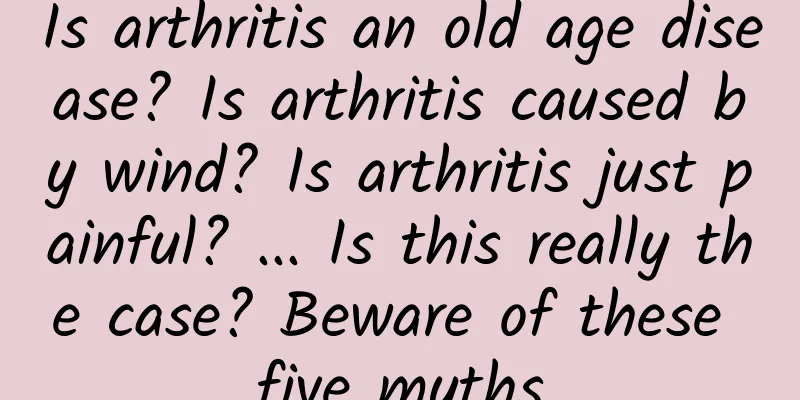Are incoherent speech and poor memory signs of Alzheimer's disease? Beware of delirium in the elderly!

|
If one day you find that the elderly in your family suddenly can't recognize people, looks at his son and asks him who he is? He speaks incoherently, his thoughts are confused, and he looks at the cloudy sky and says it's the sun... Moreover, his temper suddenly became violent, and he would get angry at the slightest thing. He was emotionally unstable, anxious, irritable, and even startled and felt that someone was trying to harm him... Image source: Photo Network Do you also think, oh no, you have Alzheimer's? The National Clinical Research Center for Geriatric Diseases reminds you that it may not be the case, it may be delirium! In daily life, it is easy to confuse delirium with Alzheimer's disease, and even think that it is normal for the elderly to talk nonsense, but this is not the case↓ Delirium , also known as acute cerebral syndrome . It is not a disease, but a clinical syndrome caused by various reasons. It usually has an acute onset and the condition fluctuates significantly. It is common in elderly patients, who have decreased cognitive function, confusion, abnormal perception, and day and night reversal. Image source: Photo Network Clinically, delirium manifests itself as: Disorientation, irritability, hallucinations, delusions, Anxiety, gibberish, irritability Delirium is not only a mental change, but also a clinical syndrome that is often accompanied by pathological and physiological changes. Delirium is a subtype of consciousness disorder and a manifestation of abnormal brain function. One of its core symptoms is attention disorder. In daily life, you can judge whether delirium occurs from the following aspects : Disorganized thinking: When asked by others about time, place or people, the patient is unable to answer correctly and has confused thinking and consciousness. Image source: Photo Network Hallucinations: including delusions of persecution, the feeling that there are insects on the wall, crowds of people around, etc., and there may also be noisy and aggressive behavior. Language changes: The patient's language may be significantly increased and confused, and he or she may not consciously talk about other things. Disordered work and rest schedule: day and night are reversed, the child cannot be woken up during the day, and cannot sleep all night. Unlike Alzheimer's disease, which is a chronic disease (more than 3 years), delirium basically has an acute onset within a week and progresses very rapidly after onset. Its severity and mortality rate are also very high . If the above symptoms occur, you should seek medical attention promptly and receive effective treatment. Many people have never even heard of delirium, so they wonder if this disease is rare or only occurs in the elderly. This is not the case. Delirium can occur at any age, but the elderly are more susceptible . The primary risk factor for delirium is the elderly with impaired cognitive function. Image source: Photo Network The main factors that make people susceptible to delirium are : Serious illness, cognitive impairment, visual and/or hearing impairment, age (>70 years old), coexisting diseases, etc. Factors that may trigger delirium include : Fecal impaction, surgery, taking antipsychotic drugs, long-term sleep disorders, malnutrition, physical restraint, urinary catheterization, taking multiple medications (≥5 types), infection, dehydration, electrolyte imbalance, etc. Although the symptoms of delirium are as mentioned above, each patient with delirium presents differently and can be divided into the following three types: 1 Active type (about 30%) Increased talking, hypervigilance, agitation, hyperactivity, oversensitivity to stimuli, hallucinations or delusions, aggressive behavior. 2 Activity inhibition type (about 25%) Decreased activity, expressionless face, slow response or lethargy. 3 Mixed (about 45%) The above two situations appear alternately, sometimes with active symptoms and sometimes with suppressed symptoms. Image source: Photo Network If an elderly person at home is suspected of having delirium, it often indicates that the elderly person has recently had some acute causes of delirium, such as infection, electrolyte imbalance, etc. It is best to seek medical attention in time. In hospitals, since there is currently no effective drug to treat delirium, doctors will intervene based on the risk factors of delirium, mainly relying on non-drug intervention plans, that is, nursing intervention. Family members can also take care of patients with delirium in the following ways: ① Identify and improve the causes of delirium, such as treating infections, adjusting medications, controlling pain, and dealing with constipation or urinary retention; ② Provide adequate water and nutrition to maintain electrolyte balance; ③ Assess vision, hearing, communication disorders and other issues, and use glasses and hearing aids to promote effective communication; ④ Use items such as clocks and calendars to increase your sense of orientation; ⑤ Promote and assist early bed-movement or wheelchair use, try to bask in the sun in the aisle or by the window, and reduce the time spent in bed during the day; Image source: Photo Network ⑥ Provide adequate rest and sleep at night, avoid excessive or improper use of sedatives and sleeping pills, and maintain a good day and night and sleep cycle; ⑦ Maintain daily routine activities and avoid unnecessary environmental stimulation, such as noise; ⑧ Arrange a familiar and fixed caregiver who can bring items familiar to the patient, such as old photos; ⑨ Promote safety but avoid restraining patients; ⑩ Use non-drug methods such as music, entertainment, nostalgia, sensory training, etc. to deal with behavioral and mental problems of dementia. When it comes to delirium, we must know that prevention is better than cure. It is important to find out the cause and treat it accordingly. At the same time, the cooperation, care, and emotional support of family members will also play a very important role. Although aging is inevitable, allowing our family members to slowly complete the last journey of their lives in a healthy environment and with emotional companionship is also a process we need to learn and experience. It will make our lives richer and more complete without any regrets, and it is the last warm bond as a family. Statement: This article is a medical-related educational popular science article. It does not involve specific treatment methods or medical behaviors and cannot replace hospital visits. Experts collaborating on this article Content Production Source: National Clinical Research Center for Geriatric Diseases (West China Hospital, Sichuan University) Editor: Yang Yali Map: Eastern Zhou Dynasty |
<<: Is lotus root starch a healthy food? How did lotus root starch become a bowl of paste?
Recommend
How many months does it take for a person to give birth?
From the moment a woman is born into this world, ...
Can natural remedies relieve rhinitis? Here are some proven and effective methods!
As the quality of life improves, people have high...
How long does it take for a birth canal tear to heal?
Nowadays, many pregnant women choose natural birt...
How to store seasonal clothes better? Tips for storing seasonal clothes
We all know that with the change of seasons, many...
How to exercise waist muscles, waist exercise has tricks
The waist is an important part that supports the ...
What kind of tea is good for women with constipation?
Sixty to seventy percent of people are troubled b...
A must-have for health preservation during the Frost Descent! This "1 Fresh" will keep you healthy all year round, collect it now!
Frost Descent is the eighteenth solar term in the...
How many kinds of canned fruits are there? What is the white thing in canned assorted fruits?
Canned fruit has bright colors, clear sugar juice...
Kidney disease patients cannot eat tofu? Reveal the truth about kidney healthy diet!
Among the many rumors about the diet of kidney pa...
Standard weight for girls 1.7 meters tall
Weight has now become an important indicator of a...
The Delta strain has just arrived, and the Lambda strain has already appeared. Do we need to take special precautions?
Currently, the most widespread and threatening st...
TCM treatment of irregular menstruation
Although irregular menstruation is a problem that...
What is the reason for watery and bloody vaginal discharge?
Leucorrhea is something that every woman has. It ...
Is it normal for your period to be 10 days late?
However, if a woman's menstruation is delayed...
What to eat during confinement to expel lochia? Eating more of this can clear the lochia
Women are relatively weak after giving birth and ...









